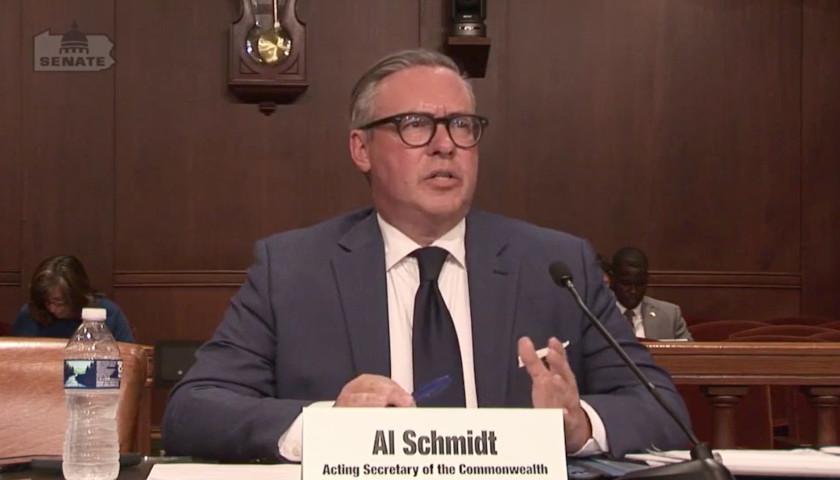At Acting Pennsylvania Secretary of State Al Schmidt’s initial confirmation hearing on Wednesday, many senators inquired about the commonwealth’s participation in a controversial voter data-sharing program.
Schmidt, a moderate Republican former Philadelphia city commissioner who subsequently was president of the left-leaning nonprofit Committee of Seventy, will sit for a second hearing covering non-electoral issues his department oversees (e.g., professional licensure). But Senate State Government Committee Chair Cris Dush (R-Bellefonte) suggested that discussing Pennsylvania’s participation in the Electronic Registration Information Center (ERIC) will also come up.
Dush is drafting legislation to remove the Keystone State from ERIC, a program Pennsylvania joined in 2016, allowing member states to share data to improve voter-roll accuracy. Seven states — Alabama, Florida, Iowa, Ohio, Louisiana, Missouri, and West Virginia — however, recently canceled their memberships, citing concerns regarding security as well as rules that the center imposes on participants. Some Republican-led states particularly objected to a requirement that member states contact eligible voters who recently moved in and prompted them to register.
Much of Dush’s dialogue with Schmidt concerned whether ERIC is achieving its aim of making Pennsylvania’s voter registration records more accurate. While Schmidt defended the program, the chairman called it a disappointment.
“If they were cleaning our bathrooms, we would have fired them long ago,” he said.
Dush cited an instance when investigative efforts in 2021 by the conservative legal nonprofit Judicial Watch led five Pennsylvania counties to cancel 178,000 improper voter registrations. He further noted that 69,000 outdated registrations were removed from the rolls in Allegheny County the previous year. The senator pressed Schmidt to clarify whether those errors would have been present had ERIC met its aim.
Schmidt answered that while the center informs the counties of errors it discovers, the counties must act to nullify bad registrations.
“The counties are ultimately the ones who have to cancel the records,” he said. “In those cases, Department of State received information that the voter had moved away, provided that information to the county to update the records…. In the cases that were in the Judicial Watch settlement, the counties didn’t do it.”
Schmidt said he would like a more active approach at the state level to guide counties to act on voter-roll corrections more promptly.
Dush asked the acting secretary to provide him with a comparison between the inaccuracies found by Judicial Watch and the errors that ERIC discovered to establish whether the latter organization was achieving its stated goal. Schmidt responded that he would do his best to provide that data. He cautioned against withdrawing from the program, asserting it helps alert the state about voters who moved away and may be registered in two locations.
Despite disagreement over ERIC, Dush said he views Democratic Governor Josh Shapiro’s appointment of Schmidt as an “encouraging sign of bipartisan efforts” to oversee elections and public licensing in a fair manner.
“I have high expectations of you, having worked with you before,” the chairman said.
Committee Democrats similarly praised the former commissioner for his conduct as a city commissioner.
“He, along with others, did not look at issues in a Democrat or Republican manner,” State Senator Anthony Williams (D-Philadelphia) said. “[He] was not concerned about the perception or the optics but about how effectively and securely people in Philadelphia can feel about their ability to vote…. He made sure that we as a city, we as a state and we as a nation could feel confidence that we… went through that election without question about integrity or manipulation.”
Williams briefly recalled that the commissioners’ handling of the 2020 presidential election drew much national attention. Many Republicans intensely scrutinized some of Schmidt’s decisions during that event. Then-President Donald Trump and others castigated the municipal official for not challenging his two Democratic colleagues on actions regarding absentee-ballot drop boxes and poll watchers.
Specifically, the critics said that if drop boxes were to be used at all more should have been set up in less Democrat-heavy neighborhoods. Republican campaign officials also objected to the city barring poll watchers from closely observing vote canvassing. That prompted the Trump campaign to file a lawsuit that failed once it was considered by the Democrat-controlled state Supreme Court.
Prior to 2020, Schmidt occasionally pleased fellow Republicans with his efforts against voter fraud and voter registration errors. In 2017, Schmidt discovered that a glitch in the Pennsylvania Department of Transportation’s “motor-voter” registration effort caused hundreds of noncitizens to register to vote in the City of Brotherly Love.
– – –
Bradley Vasoli is managing editor of The Pennsylvania Daily Star. Follow Brad on Twitter at @BVasoli. Email tips to [email protected].





